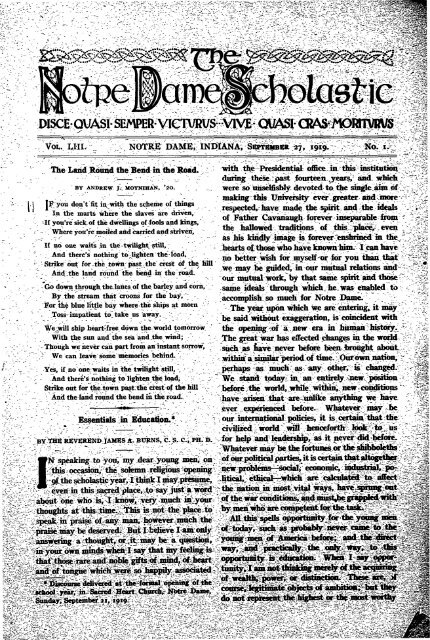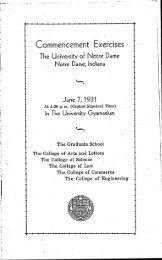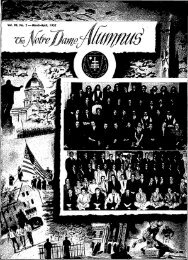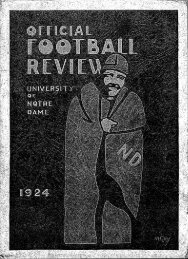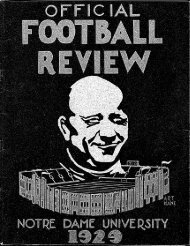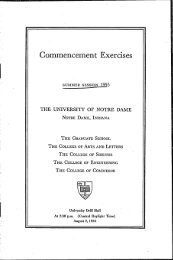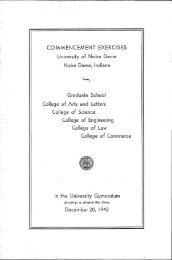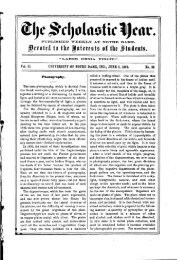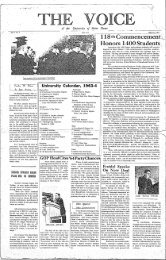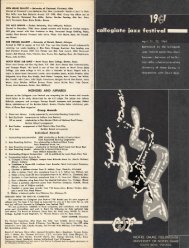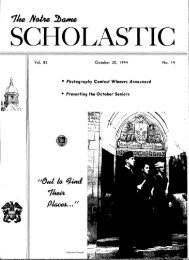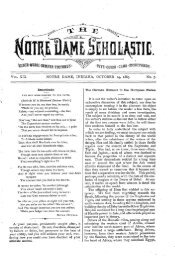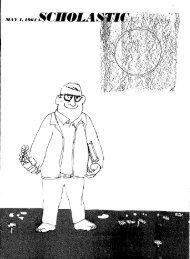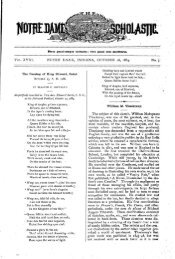Notre Dame Scholastic, Vol. 53, No. 01 -- (p. 1) 27 September 1919
Notre Dame Scholastic, Vol. 53, No. 01 -- (p. 1) 27 September 1919
Notre Dame Scholastic, Vol. 53, No. 01 -- (p. 1) 27 September 1919
Create successful ePaper yourself
Turn your PDF publications into a flip-book with our unique Google optimized e-Paper software.
DI5CErCWASFSEAU>ERVieTW»/S-^^^<br />
. : . • ' ^ . :. -<br />
•ri "^—: r^—;—<br />
VOL. LIII. \<br />
"-' - " •- --•'• •--•• -•^-.•-
aA^-y>fr-<br />
TStte Hoc\'e bame Schdascie<br />
ambition. Rightly looked. at, they are only<br />
means to an end. They are valuable chiefly<br />
for what one may do with them. They make<br />
possible things which are immeasurably more<br />
precious than they are themselves for human<br />
life—^things which may be comprehensively<br />
described as service to God, to one's coimtry,<br />
or to one's fellow men, in large and unselfish<br />
ways. Only that education is fully worthy of<br />
the name which is calculated to awaken these<br />
higher and nobler ambitions of life, and to<br />
prepare one effectively for their realization,<br />
over and above the mere attainment of what is<br />
commonly called success.<br />
<strong>No</strong>w, what is meant by an education such as<br />
this? What are its essential qualities? and what<br />
are the means to its acquirement? Our consideration<br />
of the matter will be apt to be more<br />
profitable if we look at it from the standpoint of<br />
the student, rather than from other possible<br />
v'^antage points.<br />
True education . implies and demands two<br />
essential things on the part of the student.<br />
The mind is nourished and developed by assimilated<br />
truth, and this means, on the part of tne<br />
student, study—earnest, intelligent, patient and<br />
painstaking study. The reasons for this are<br />
so obvious and elementary that I do not consider<br />
it necessary to advert to them, and yet there are<br />
certain important aspects of the matter which<br />
are only too easily lost sight of.<br />
<strong>No</strong>t only must the essential work of mindtraining<br />
be a strictly personal affair, but it is<br />
equally certain that the amount of mental<br />
advantage that is gained by the student at<br />
collie is, ordinarily speaking, directly proportional<br />
to the amount and quality of his<br />
own personal efforts. The college or university<br />
may, in this respect, be likened to a gymnasium.<br />
Lectures and books, lessons and exercises,<br />
of whatever" kind—^these things are merely<br />
apparatus, through the use of which mental<br />
growth is aided and stimulated. We know that,<br />
a boy who goes to the gymnasium will, generally<br />
speaking, make progress in the. work just to the<br />
extent that he devotes himself to it with earnest<br />
purpose. Gymnastic or athletic skill will iur<br />
evitably result from steady practice, under<br />
efficient direction; but his progress will evidently<br />
be dependent upon the time and attention he<br />
devotes to the work./ It is predsely the same<br />
in the work of the great, mejitali^nnnasium we<br />
call collie or'university. The equipment is<br />
there; the competent, skillful direction is there;<br />
but progress will be in proporiion, not so much<br />
to these elements, as to the responsive efforts<br />
which are made by the student himself. Greater<br />
efforts will bring greater and more lasting<br />
results; little effort, or no effort at all, will<br />
mean, in the long run, little or nothing of<br />
real, lasting mental advancement or profit..<br />
It is fundamentally a matter of personal effort.<br />
It will be helpful, therefore, to remember that it<br />
is chiefly when you are alone, in your room or<br />
at your desk or in the Ubrary, that you are<br />
determining how much this University, with all<br />
its vast educational equipment, is • really worth<br />
to you.<br />
Again, the intellectual growth which comes to<br />
a young man at college, as the result of well<br />
directed and earnest study, is small in comparison<br />
with that which his mind will in consequence<br />
experience later on in life. There are<br />
capacities or powers in the soul which must be<br />
awakened now, or they are likely to remain<br />
forever sterile. How often we see a boy who is<br />
bright, and clever beyond his fellows at college,<br />
and yet who is far outdistanced in the race of<br />
after life by a student of only moderate talents!<br />
Why? It is because—and every experienced<br />
teacher knows how true this is—^it is because,<br />
in the one case, the deeper springs of thought<br />
and knowledge within the mind remained all<br />
untouched or undiscovered, while in the other,<br />
through patient searching and laborious effort,<br />
joined to the quickening experiences of maturer<br />
age, they were turned into perennial sources of<br />
mental vigor and power. It is here that we<br />
really find the supreme test of the value of the<br />
work done by a student at college, as well ao<br />
the crowning merit, of an institution of higher<br />
education.<br />
Our Blessed I^rd, in describing the growth of<br />
the Kingdom of God within the soul, said that<br />
it is "as if a man should cast seed into the earth,<br />
and should sleqp and riser night and day, and<br />
the seed should spring and grow up whilst he<br />
knoweth not; for the e^h of itself bringeth<br />
forth ftiiit, first the blade, then the ear, afterwards<br />
the full corn ins the ear. And when the<br />
fruit is brought forth, immediately he putteth<br />
in the sidde, because the harvest is come."<br />
The description is equally applicable to the<br />
growth of the.kingdom of the/mind. The work<br />
of these colli^iByears^thijs^ringtime of your<br />
life—-hj^ a my^mous, wonderful potency. Every<br />
hour of piirposeful stiidyi ey©^ mastering of<br />
difficjdties,'ey«ry enM^<br />
vision.
M<br />
.M^<br />
'Sfie <strong>No</strong>cre dame^hotascic<br />
every studious habit formed, every new intellectual<br />
interest arousied, besides the benefit it<br />
brings you here and now, is sure to bring you a<br />
hundredfold more in the years to come. For<br />
these things are, in very truth, as seed which<br />
you are day by day casting into the earth;<br />
and whilst you know it not, whilst you sleep and<br />
rise, night and day, this seed will of itself<br />
spring up and grow, putting forth blade and ear,<br />
and ripening into the full com of a glorious<br />
harvest of knowledge, wisdom, and intellectual<br />
power.<br />
But there is another essential element which<br />
must,be supplied by the student in true education—^it<br />
is self-discipline. The will, no> less than<br />
the mind, needs to be trained; and the training<br />
of the will, like that of the mind, is something<br />
which, in the last analysis, has to be done by<br />
the student himself.<br />
Millions of American young men had occasion<br />
to learn, during the war, the discipline of the<br />
modem army. They found, on entering the<br />
camps, that there were strict laws and regulations<br />
which had to be learned and obeyed without<br />
question. They realized that these laws and<br />
regulations were necessary for the eflBciency<br />
of the army—^necessary ultimately for the<br />
preservation of their own liberties; and th^y<br />
learned them quickly and obeyed them cheerfidly<br />
because of this intelligent knowledge of<br />
their purpose. If our armies attained their high<br />
efficiency in so short a time; if, when assembled<br />
on the fields of France, they became an invincible<br />
host, which broke the enemy's might at almost a<br />
single blow, it was, we know, because the young<br />
men of America had thoroughly learned this<br />
lesson of military discipline, and had loyally<br />
subordinated their own wills, with all thiir<br />
personal interests, to its imperious behests. <<br />
Of infinitely greater consequence than an)'<br />
rules of military discipline are the laws which<br />
every man is called upon by his Creator to obey,<br />
by reason of his rational nature. These laws<br />
embody the fundamentally unchangeable relations<br />
of a man with God, with his neighbor, and<br />
with himself. They are the laws of individual<br />
life, of the family, of society, of legitimate<br />
government, of religion. They are found'imbedded<br />
in the human conscience, or proclaimed<br />
by God through His accredited representatives.<br />
These laws do indeed put a restraint upon the"<br />
will; but it is a restraint which, far more truly<br />
than in the case !of"the army regulations, has,no<br />
other end than to preserve and augment the<br />
individual's legitimate freedom. They thus<br />
constitute what St. Paul has so aptly called<br />
man's "reasonable service." It is by endeavoring<br />
to know and understand these great laws of life<br />
and morality and their ultimate purpose, by<br />
conforming one's conduct to them and ever<br />
striving after more perfect conformity with<br />
them, that, with the help of divine grace, the<br />
will is liberated from the tyranny of the passions<br />
and enabled to bring these disorganized elements<br />
of fallen nature under orderly subjection and<br />
control; is enabled to rise above the sordid,<br />
selfish, merely material aims that dominate the<br />
lives of most men, even those who are classed<br />
among the educated; is made capable of sacrifice,<br />
and of the noble and holy ambition of working<br />
for the welfare of others, whether it be in the<br />
service of society or the state, or in the service of<br />
the Churdi. Such a will, thus purified, strengthened,<br />
become master of itself and of all its own<br />
inferior powers, is like a commander at the head<br />
of well-disciplined, victorious soldiers: it is<br />
prepared, in the words of the Apostle, to "fight<br />
the good fight," to wage victorious warfare, not<br />
only against flesh and blood, but "against<br />
principalities and powers, against the rulers of<br />
the world of this darkness, against the spirits of<br />
wickedness in the high places."<br />
It is to the glory of this University that she<br />
has ever made this kind of training one of her<br />
primary 'aims,' and that she has consistently<br />
proclaimed that without this training and<br />
discipline there can be no such thing as true<br />
education, which must necessarily consist in<br />
the development of the entire man. She has<br />
her own laws and regulations which she has<br />
found by experience to be requisite for the<br />
orderly^ and fruitful carrying on of her work.<br />
She asks obedience to these laws and regulations^<br />
both because they are partial expressions of<br />
those deeper and more fundamental laws which<br />
God has set in the human heart and in the<br />
heart of human society, and because, through<br />
conscious and willing obedience to them, you<br />
will be acquiring that self-discipline which, as I<br />
have said, is of the^very essence of tnie.education.<br />
She surrounds you with an atmosphere of<br />
religion, for religion not only clearly reveals the<br />
Creator's laws, but it also supplies the most<br />
efficacious means and motives, for &eir faithful<br />
observance. Religion brings divine g^ce and<br />
the-sacraments; it teaches humility and prayer;<br />
it places before us the example of Christ and.<br />
the saints; and it shows ns virtue and vic^.
^-•i sjs'i«"^s,:r-^ ;." ' : / ;<br />
. I^ream in oMyioii-suii:; ~\,,;;'<br />
A At Thy- tbi& on {-my? Ups! -<br />
'. "ihy-cxeaUtteSf^/I. had tiio^^^'<br />
-{-Codd -be .iqtriBdj;. 'apatti'r^'jr':^:''-^-<br />
<strong>No</strong>w; cteattunes, (»unt^for Jaaught":<br />
..-;^ve in Thy: inde;ffiart;-;;rs:-A.<br />
Summer School Verse.<br />
* THE FIRST CLASS.<br />
{Early Mass in Walsh Hall.)<br />
In the gray of early morning, when the day<br />
Is brushing mists from sleepy eyes away, _<br />
Down to the Lower Room, , = -<br />
Still dim in candled gloom, -<br />
Silently.the students' pass<br />
To where the Master waits His class.<br />
In the accustomed way,<br />
Introibo ad allare Dei, _ -<br />
The lesson opens; and with eager hearts '<br />
We follow all the parts. ^<br />
Quickly they move.<br />
Borne on by love.<br />
Sometimes He speaks, by silences; again.<br />
His voice re-echoes in one's ieart,—and then,<br />
(O I
s-=:yi--^-;s»a<br />
^M<br />
'^'^^f^<br />
--'^y^'-m<br />
•vma<br />
'Sfie <strong>No</strong>ci^ dameSchokwcicr<br />
The Summer iSesinon.<br />
The second summer session of the University<br />
of <strong><strong>No</strong>tre</strong> <strong>Dame</strong> opened on June 28th last and<br />
closed the 8th of August. >It was conspicuously<br />
distinguished from the preceding session by a<br />
notable increase in enrollment. More than five<br />
hundred students registered for. the various<br />
courses. At the previous summer session Walsh<br />
Hall was given over to the ladies; with'such a<br />
marked increase in attendance this year Badin<br />
Hall was also converted into a ladies dormitory.<br />
The men occupied Sorin and Cjrby Halls under,<br />
the rectorship of Fathers Eugene Burke and<br />
Patrick Haggerty respectively. There were in<br />
attendance nearly three hundred nuns, representing<br />
some twenty-five different orders.<br />
'Early in the session the school was honored<br />
by a visit from the Reverend John A. Dillon,<br />
superintendent of schools of the diocese of<br />
Newark, New Jersey, who gave, fivevery interesting<br />
and instructive lectiures on CathoUc<br />
Education. Father Dillon chose the following<br />
subjects for his lectures:. The Problem;. The<br />
Child, the Root of the Problem; The Parent,<br />
the Crux of the Problem; The Teacher, the<br />
Critical Element of the Problem; The State,<br />
the Uncertain Element of the Problem. The<br />
faculty of the College of Music presented several<br />
d^ighcful and varied programs. Mr. Williain<br />
Middleschtilte, one of the most noted organists<br />
and composers of the present time, gave in the<br />
University Church a series of masterly organ<br />
recitals embracing the composidons of the<br />
ancient, the middle-age, and the modem masters.<br />
. All of^his recitals were largely attended both by<br />
students and by visitors from South.Bend and<br />
vicinity. Mr. George O'Conneli of the vocal<br />
department, a composer and artist of- mierit,<br />
rendered several excellent concerts in Washington<br />
Hall. Mr. Q'Connell has a pleasing<br />
tenor voice of unliiilited; range and power, ^nd<br />
his well-seiected Spanish,' French, Italian, and<br />
-Irish songs gave hhn the opportunity to display^<br />
his ability to its best advantage. The University<br />
choir, under.the direction of Father Marshall,<br />
gave an impressive amcert in the Sacred Heart-<br />
Church, presenting^ all the various styles of<br />
Church music yis Set forthvin \h&MoiuProprio<br />
:;
6 , ^S^<strong>No</strong>credomeSdiokwcic -<br />
.< The Eucharistic Congress at <strong><strong>No</strong>tre</strong> <strong>Dame</strong>. of social unrest and godless tendencies, and the<br />
' imperative duty of all pastors to safeguard their<br />
Towards the close of summer school in the flocks by zealously arousing their interest and<br />
first days of August, the Silver Jubilee Convention increasing their devotion to the " Hidden God."<br />
of the "Priests' Eucharistic League" was held Of the many beautiful ceremonies of the<br />
here at <strong><strong>No</strong>tre</strong> <strong>Dame</strong>, where, a quarter of a Congress, the most impressive was undoubtedly<br />
century before, its members had met for the the grand procession with the Blessed Sacrament.<br />
first time in the United States^r-'It was then<br />
under. the zealous leadership of the saintly<br />
through the college grounds. The priests marched<br />
in white vestments, and the bishops in mitre<br />
Bishop of Covington, Kentucky, Rt. Rev. and cope immediately preceded the Blessed<br />
Camillus Maes; it is now-in charge of Rt. Rev. Sacrament. Hundreds of nuns, including the<br />
Joseph Schrembs, Bishop of Toledo, who Sisters of Holy Cross from the convents at<br />
oflSciated for the first time at this meeting. <strong><strong>No</strong>tre</strong> <strong>Dame</strong> and St. Mary's and representatives<br />
The number of priests in attendance was not of many congregations attending the summer<br />
SO-large as might have been expected but every school followed the Sacred Host, adding to the<br />
section of the country was represented, y^mong solemn grandeur of the scene. Benediction was.<br />
the distinguished clergy present w^re: Rt. given from an altar which had been erected in<br />
Rev. Joseph Alerding, of Fort Wayne; Most front of the Main Building. As the venerable<br />
Rev. Sebastian Messmer, of Milwaukee; Rt. Metropolitan of Milwaukee raised; the Sacred<br />
Rev. Edward Allen, of Mobile, Alabama; Rt. Host in blessing over the assembled multitude,<br />
Rev. Joseph Chartrand, of Indianapolis; Rt. the deep-toned voice of the great bell thundered<br />
Rev. Msgr. John Peterson, rector of St. Mary's forth from the church tower, and the clouds,<br />
Seminar}^ Boston; Rt. Rev. Msgr. Alfred threatening rain a moment before, broke into<br />
l^anning, Lima, Ohio; Very.Rev. Bede Maler,<br />
O. S. B., founder of the League in the United<br />
fleecy, golden forms, letting the last rays of the<br />
sun steal through to gild the scene with soft effulgencel<br />
States and Very Rev. John Graham, S. S. S.,<br />
After the Divine Praises had poured<br />
Director-General of the League. Hundreds of<br />
priests and many bishops expressed by letter<br />
or telegram regrets for their inability to come<br />
and made encouraging assurances of their<br />
co-operation.<br />
The Holy Father through the Cardinal Secretary<br />
of State* imparted the Apostolic benediction to<br />
forth in grateful adoration from a,thousand<br />
overflowing hearts, the white-vested priests arose<br />
and with outstreched arms intoned the "Pater<br />
<strong>No</strong>ster." It was a tableau truly in keeping with<br />
that djiy's festival. The Transfiguration; and<br />
many a soul, lifted nearer to its Maker, and<br />
sensing in a faint degree what the joy of the<br />
^^$i;A^:..:-L22s-~<br />
':-~-rp' w:::"'^-<br />
the members of the conference and expressed vision of the eternally transfigured God must be,<br />
the desire "that through, such union; apostolic cried out with St. Peter, "LQrd, it is good for<br />
zeal and sanctification of clergy may be fostered us to be here."<br />
and increased." The message was read by '' The Holy Hour, also conducted by Bishop<br />
Bishop Schrembs at the opening session in Schrembs was a soul-mspiring ceremony. During<br />
Washington Hall, the assembled clergy standing the exposition, priests and people joined in<br />
during the reading. After this the delegates the glorious words ol the Church's grandest<br />
were welcomed to the diocese by Bishop hymns—"Adoro Te," "cVeni Creator," the<br />
Alerding.<br />
"Magnificat,"^ and the "'Te Deum." The<br />
On Monday evening, August the 8th, the<br />
directors of the League met in the library to<br />
arrange the program and'appoint, the committees.<br />
The Congress was publicly opened the<br />
following morning with;the.solemn pontifical<br />
Mass, celebrated by Bishop Schrembs. A<br />
solemn procdssion started froth the Administration<br />
Building and passing around the Qiuadcangle<br />
preceded ^the MassT Most Reverend Sebastian<br />
Messmer delivered the opening sermoii, discoursing<br />
on the beauties of the Euclwrist> the heed<br />
for ever greater devotion thereto in these times<br />
beautiful and practical meditation prepared by<br />
Bishop Schrembs for this occasion was truly a<br />
masterpiece of Eucharistic devotion.<br />
Those attending the; conferences
". - :-.^ K-riii',^©^<br />
"Sfie <strong>No</strong>cre dome^cholasciGr<br />
apostle of the.Blessed Sacrament. Among the<br />
other papers read, were: "The Priest, Ministei<br />
of Holy Communion" by Rt. Rev. Msgr. John<br />
Petersop, of St. Mary's Seminary, Boston,<br />
and "The Confessional in its Relation to the<br />
Eucharist" by the Rev. Arthur Barry O'Neill,<br />
V^> 0><br />
V^*<br />
Oti the third and last morning of the Congress,<br />
a solemn pontifical Mass of. requiem tor the<br />
•repose of the soul of theTgcently deceased Bishop<br />
Maes, the first president-geneial of the League,<br />
was celebrared oy bis successor, Rt. Rev. Joseph<br />
Schrembs. A short session, closing the Congress,<br />
was then held, and the Silver Jubilee Cofvention<br />
had passed into history. May God spate for<br />
lUfther triumphs in His service the men who<br />
so energetically conducted it.<br />
Thoughts.<br />
W. H. ROBINSON.<br />
BY STUDENTS OF THE SUMMER SCHOOL.<br />
Let no hour pass without a smile.<br />
<strong>No</strong>t every man that looks wise is so.<br />
Who occupy the pedestals in your Igantheon?<br />
An hoiu" of thought is worth a day of reading.<br />
The only true scholar is the lifetime scholar.<br />
What is worth dying for is siu^ely worth living<br />
for.<br />
« ^ • • •<br />
Argument often generates more heat than<br />
light.<br />
" -•<br />
Nationality is human nature with a local<br />
coloring.<br />
Wisdom must temper hiunility lest folly be<br />
its end.<br />
Everyone believies- easily what he wants to<br />
' believe.<br />
, The wise man is silent because he has too mudi<br />
to say. . .,<br />
A word in the head is worth two in the<br />
dictionary.<br />
Saving, money is sometimes the sheerest<br />
extravagance.<br />
Great works, like great rivers, have small<br />
beginnings. .<br />
The world has nothing more beautiful than<br />
a happy home. , , . -<br />
•Is the suffragette selUng her birthright for a<br />
m^ of pottage? . r -<br />
. Giodin His wisdpin gavetnah the head and<br />
woman the heart. -<br />
Trial shows the mettie of a man and war the<br />
mettle of a nation.<br />
There are tons of silt on some of the finest<br />
bed rock in the world.<br />
He* who habitually makes excuses is but<br />
another kind of'coward.<br />
Many who seem to know much are but<br />
parasites on dead men's brains.<br />
^o many think that a man's virtue depends<br />
upon the length of his face.<br />
Striking for higher wages is striking for<br />
"your altars and your fires."<br />
In school, as at dinner, too m^ny courses<br />
are apt to give indigestion.<br />
Was there ev^er a child who did not fall in<br />
love with God at first sight.<br />
Ireland was the first ship of state launched<br />
off the west coast of Europe.<br />
The man who is ashamed of his religion is<br />
ashamed of sDmething he has not.<br />
The green felt on the Peace Table ought to<br />
have reminded the Conference of<br />
Is the path to the library meant to symbolize<br />
the roughness of the road to knowledge/<br />
Our life should not be so iull of business as<br />
-to exclude rest and cheerful recreation.<br />
A'serious fault with our education is its effort<br />
to feed rather than create an appetite. ^<br />
"^ We never know what we can do until we have<br />
to: we have stood prohibition for three long<br />
months.<br />
Congriess seems to, have felt that "open<br />
covenants openly arrived at" called for woman<br />
suffrage.<br />
. Sometimes oiir success depends upon ^dur<br />
stepping aside and letting someone else finish<br />
the job.<br />
"lyooking backward" may be aSL right as an<br />
occasional pastime, but when it becomes a<br />
preoccupation the feet follow the eye.<br />
Amid these radiant beauti^ many sigh for,<br />
the artist's brush or,the writer's pen, but who<br />
thinks to pray for'the poet's appreciation.'<br />
If an artist were to paint the simsfet on St.<br />
Joseph's lake soine realist would urge him to<br />
picture Nature as she is and not as he ims^g^es<br />
her to be.<br />
It is likely that the political aspirants in 1920<br />
will base their claims to public fecogbhion npob<br />
the numbed of bombs they recdved dunng the<br />
recent reign of terror. ' r '• "v
8 Ipfie <strong>No</strong>cn& (bame Sdhdastic<br />
^otpePame^cbolastic<br />
DISCCQUAS!SEy^\PERVICTV?RUS"VlVE-QUASia^\S-;^lORITV'RVS<br />
Entered as Second-Class Mail Matter.<br />
Published every Saturda3' during the School Term at the<br />
UNIVERSITY OF NOTRE DAME.<br />
VOL. LIII. SEPTEMBER <strong>27</strong>, <strong>1919</strong>- NO. I.<br />
WILLIAM C. HAVEY, '20<br />
CHARLES A. GRIMES, ' 20<br />
CORNELIUS PALMER, '20<br />
THOMAS H. BEACOM, '20<br />
ALFRED N. SLAGGERT, '21<br />
Board of Editors.<br />
ROBERT E. O'HARA, '20<br />
PAUL SCOFIELD, '20<br />
THOMAS J. TOBIN, '20<br />
J. SiNNOTT MEYERS, '20<br />
JAMES W. HOGAN, '21<br />
YVT'E of the SCHOLASTIC take advantage of<br />
this first issue of our magazine since the<br />
change in the administration of the University<br />
to extend to Father Burns, the new president,<br />
to Father Irving, the new director of studies,<br />
and to the other new members of the Facult}'-<br />
our congratulations and on the part of the<br />
student body to assure them of the continued<br />
loyalty which the students of <strong><strong>No</strong>tre</strong> <strong>Dame</strong> have<br />
always been proud to yield to those at the head<br />
of our great school. We wish and confidently<br />
hope for them in their work a success commensurate<br />
with their qualifications and zeal. May<br />
<strong><strong>No</strong>tre</strong> <strong>Dame</strong> under their direction and by the<br />
grace of God grow in her good work to"the fullest<br />
proportions.<br />
<strong>No</strong>t only the old students who were present<br />
in the University chapel last Sunday but all<br />
indeed who have attended <strong><strong>No</strong>tre</strong> <strong>Dame</strong> since<br />
<strong>September</strong> of 1905 will testify how well deserved<br />
are the beautiful words of tribute paid by<br />
Father Bums in his sermon at the opening otthe<br />
school year (published in the first pages of this<br />
issue) to his illustrious predecessor, Father<br />
Cavanaugh. We would not impair that tribute<br />
by any addition but merely ratify it as the<br />
expression of our sentiment towards him who<br />
has done so much for our beloved <strong><strong>No</strong>tre</strong> <strong>Dame</strong><br />
and for us. To Father Cavanaugh, Father<br />
Schumacher, Father Eugene Burke, and the<br />
other members of the former faculty who are<br />
no longer with us we acknowledge our debt of<br />
gratitude for their years of unselfish service in<br />
our interest. However far away duty may take<br />
them, the)"- will be followed by the affection of<br />
all who have been privileged in their association<br />
here. May they be attended in their new<br />
positions by all the success they chemselves<br />
can Avish for.—The Editors.<br />
There is in this country since the end of the<br />
war a notable awakening of the missionary<br />
spirit. In the days of strife the American<br />
people were prompt and<br />
The Call of the' generous in helping those<br />
Bengalese. of other lands who were<br />
suffering from the desperate<br />
privations consequent upon the modern warfare.<br />
This . philanthropic work naturally interfered<br />
with the attention and support which would<br />
otherwise have been given to the cause of the<br />
foreign missions. The souls of the Far East<br />
were more or less forgotten. It can now be<br />
happily otherwise, and America is barkening<br />
to the can of her missionaries. Considerable<br />
enthusiasm has already been aroused by the<br />
wide circulation of literature in behalf of the<br />
missions. <strong>No</strong>t the least of the periodicals devoted<br />
to this cause is the one being issued this month<br />
for the first time,by the Congregation of the<br />
Holy Cross, the Bengalese, the purpose of which<br />
is "to aid-by prayer and alms the foreign missions<br />
in the Diocese of Dacca, in India.'-' This<br />
organ will surely be of great help to the workers<br />
in that vineyard, most of whom are graduates<br />
of <strong><strong>No</strong>tre</strong> <strong>Dame</strong>. Very few .of us have the calf<br />
to do what they are doing, but all can and<br />
should help this publication which means so<br />
much to the missionaries, who are so truly our<br />
own. We must unite in making it completely<br />
and quickly successful.. Let the <strong><strong>No</strong>tre</strong> <strong>Dame</strong><br />
spirit function in this direction where it can do<br />
^so much of the greacest good. We should hail<br />
the appearance of this new magazine as the<br />
beginning of a new era in the work of the Holy<br />
Cross missionaries. Let us be sure that these<br />
men of <strong><strong>No</strong>tre</strong> <strong>Dame</strong> have at least the benefit<br />
of our most fervent prayers, of our donations<br />
to the "poor-Ben boxes" in the various halls<br />
of the University, and above all of our staunch<br />
and practical support of the paper which represents<br />
their interests.—r. c. D.
'^e <strong>No</strong>cr& (bame Scholascic<br />
Father Bums, President of <strong><strong>No</strong>tre</strong> <strong>Dame</strong>.<br />
The remarkable growth and development of<br />
the University. of <strong><strong>No</strong>tre</strong> <strong>Dame</strong> is remarked in<br />
the article on <strong><strong>No</strong>tre</strong> <strong>Dame</strong> in the Catholic<br />
Encyclopedia as being due, in large part, to the<br />
superior excellence of her presidents. The<br />
truth of this statement becomes immediately<br />
apparent when we recall a few of the names in<br />
that long list beginning with the great Sorin<br />
and ending with our beloved Father Cavanaugh.<br />
REVEREND JAMES A. BURNS. C. S. C.<br />
Exceptional men they were—^men of learning,<br />
vision, and broad catholicity, and <strong><strong>No</strong>tre</strong> <strong>Dame</strong><br />
stands today a monument to their faith and<br />
genius.<br />
It is small wonder then that the members of<br />
the Provincial Chapter of the Holy Cross<br />
Congregation deliberated long and prayerfully<br />
in their selection of a new president. The"<br />
necessary qualifications were such that only a<br />
man of the highest attainments could be<br />
considered. Wide executive experience, deep<br />
spirituality, profound learning, tact, and resourcefulness,<br />
together with exceptional ability in the<br />
work of education; are only a few of the requisite<br />
qualities. Hence knowing the traditional standard<br />
set up for the presidential candidate, and<br />
the rare qualifications needed, it is no surprise<br />
that the choice fell upon the Reverend James<br />
A. Burns.<br />
For the past nineteen years Father Bums has<br />
served as president of Holy Cross College,<br />
Brookland, D. C, where his able and zealous<br />
work in behalf of Catholic education has been a<br />
constant source of inspiration to the many<br />
student priests of Holy Cross who during that<br />
period have come under his direction. <strong>No</strong>r<br />
have his efforts been confined to the interests<br />
of his own Congregation. Always a close<br />
student of American educational- conditions, he<br />
has been a persistent advocate of the Catholic<br />
school system, and his numerous contributions<br />
on the subject to Catholic magazines, together<br />
with the pubUcation of an authoritative twovolume<br />
"History of Our Catholic Schools,-'<br />
and a comprehensive study of thd entire field<br />
of Catholic educational ejBfort, entitled "Catholic<br />
Education: A Study of Conditions," have won<br />
for him high rank among the American<br />
educators of today. He was one of the founders<br />
of the Catholic College Conference in 1889 and<br />
of the Catholic Educational Association in 1904,<br />
having served in the capicity of vice-president<br />
and director of the latter from the time of its<br />
organization to the present. In 1905 he received<br />
the degree of Ph. D. in Philosophy and Education<br />
from the Catholic University of America, at<br />
Washington, D. C.~<br />
It is, however, as a product and now as head<br />
of our University that Father Bums is of<br />
greatest interest to students of <strong><strong>No</strong>tre</strong> <strong>Dame</strong>.<br />
A native of Michigan City, Indiana, he obtained<br />
there his early education, after which he came<br />
in 1881 to <strong><strong>No</strong>tre</strong> <strong>Dame</strong> to take up his studies in<br />
preparation for the priesthood as a member of<br />
the Congregation of the Holy Cross. During<br />
his college course he took an active interest in<br />
athletics, played on the varsity baseball team<br />
as catcher for two seasons, and in recognition<br />
of scholastic excellence was given the Quan<br />
Medal in his senior year. In 1888 he graduated<br />
with the degree of Bachelor of Arts and entered<br />
the <strong>No</strong>vitiate. After teaching for two years at<br />
Sacred Heart College, Watertown, Wisconsin,<br />
he was transferred back to <strong><strong>No</strong>tre</strong> <strong>Dame</strong>, where<br />
he remained for eight years, teaching chemistry<br />
and Greek, serving meanwhile first as prefect of<br />
Sorin, then as rector of that hall, and finally as<br />
superior of the Community House.
-';.. ^4-n-Ci^-I<br />
lO<br />
'^Re <strong>No</strong>n
-^^m<br />
'Sfie Hocie dame Schokwcie<br />
II<br />
Band; Father William Lennartz, master of<br />
novices; Brother Florentius, superior of Dujari^<br />
Hall; Father William Connor, chaplain at St.<br />
Mary's.- Father Boland, formerly president of<br />
Columbia University, was appointed purchasing<br />
agent for <strong><strong>No</strong>tre</strong> <strong>Dame</strong>.<br />
Father De Wulf, lately president of St.<br />
Edward's College, is now teacher of analytic<br />
mechanics ^at^ <strong><strong>No</strong>tre</strong> <strong>Dame</strong>; Father Gassensmith,<br />
formerly professor at Columbia, prefect<br />
and professor at <strong><strong>No</strong>tre</strong> <strong>Dame</strong>; Father Eugene<br />
Burke, formerly professor of English and rector<br />
of Sorin, President of Columbia University,<br />
Portland, Oregon; Father Crumley, professor<br />
of English and Philosophy and formerly vicepresident<br />
at <strong><strong>No</strong>tre</strong> <strong>Dame</strong>, professor at Columbia;<br />
Father Oswald, Dean of the Classics at <strong><strong>No</strong>tre</strong><br />
<strong>Dame</strong> for the last decade, professor at Columliia;<br />
Father Edward Finnegan, late chaplain in the<br />
army, professor at Columbia; Father James<br />
McElhone, assiitant-superior of the Seminary;<br />
Father James Stack, for the past year engaged<br />
in parish work in Austin, Texas, professor in<br />
the arts department at <strong><strong>No</strong>tre</strong> <strong>Dame</strong>.<br />
Brother Albeus, who spent more than a year<br />
in Australia canvassing for the Ave Maria, is<br />
back at his former post of prefect in Brownson.<br />
Brother Aloysius, stationed for the past two<br />
years at Columbia, has taken the place of<br />
Brother Maurelius in the candy store, tvhich<br />
has been transferred from the basement of the<br />
Administration Building to the new storeroom<br />
under the tailor shop.<br />
—vf. c. H.<br />
^•^<br />
Local News.<br />
—^Father Bums, president of the University,<br />
visited the various rooming halls during the<br />
week and read the rules of discipline. It is probable<br />
that he will address the day students<br />
sometime during the coming week.<br />
^Brother Emilius, the postmastel* at <strong><strong>No</strong>tre</strong><br />
<strong>Dame</strong>, urgently requests of all students at the<br />
University to have the mail coming to them<br />
addressed tothe particular hails in which they<br />
reside.. Doing this will insure to the student<br />
the prompt delivery of his mail—^which cannot<br />
be guaranteed in any other way.<br />
. -T-The scholastic year was formally opened<br />
last Sunday . in Sacred Heart Church by a<br />
solemn High Mass. The sermon, wliidi is<br />
printed elsewhere in' the LScHOiiASMc, was<br />
preached by the Reverend President Burns.<br />
Father Matthew Walsh was celebrant. Father<br />
Thomas P. Irving, deacon, and Father James<br />
Gallagan, sub-deacon.<br />
—^Father GaUagan, Prefect of Discipline,<br />
desires to call the attention of the new students<br />
to the point of University rule that the front<br />
steps and proch of the Main Building are for<br />
the use of the faculty and visitors only. All<br />
students are asked to use thie entrance under<br />
the front steps in going to and from the Main<br />
Building and the rear steps inside in going to<br />
the first floor and the class rooms.<br />
—^Members of the <strong><strong>No</strong>tre</strong> <strong>Dame</strong> Council of<br />
the Knights of Columbus have returned to the<br />
University with firm determination to put the<br />
proposed fund for the social center building<br />
"over the top." Many of them devoted their<br />
spare hours during the summer months tj<br />
securing donations from various friends of the<br />
school and with their personal savings materi-<br />
, ally augmented by their vacational employment<br />
are prepared to "balance up" the individual<br />
quotas.<br />
—Just preceding the opening of school<br />
important retreats were held at <strong><strong>No</strong>tre</strong> Dam^.<br />
The first, preached by Father Thuente, O. P.y<br />
to the priests of the Diocese of Fort Wayne,<br />
lasted from the eighteenth to the twentysecond<br />
of August. Later two retreats for the<br />
priests of the Archdiocese of Chicago occupied<br />
two weeks, approximately three hundred priests<br />
attending from August twenty-fifth to the<br />
thirtieth and the same number from <strong>September</strong><br />
first to the sixth. The retreat for tiie Chicago<br />
priests was given by Father M. J. O'Comun-, S. J.<br />
—^At the dose of the summer session more<br />
than seventy paintings done l>y the students<br />
of the art course were exhibited in the corridor<br />
of the first floor of the Main Building. The<br />
class in painting und^ the masterly instmction<br />
and direction of Dom Gregory Gerrer, O. S. B.,<br />
fully sustained the reputation of <strong><strong>No</strong>tre</strong> <strong>Dame</strong>'s<br />
department of fine arts. Scenes about the<br />
campus provided inspiration for most (tf the<br />
landscape paintings. There were also on display<br />
some remarkable studies in still life and an<br />
excellent.portrait of Father Maher, the venendbk':<br />
Holy Cross priest who celebrated this year<br />
the golden jubilee of his ordination. :<br />
—Jt is announced that the H
5?SS.-^i>S^--^i,-,<br />
t^'^l-i^-X^^?*-X5«:riJr.
'^fie <strong>No</strong>cre domeSchGlcMcic 13<br />
outside . guard, C. Kasper; trusteesr Rev.<br />
Joseph Maguire, C. S. C, Rev. Wm. A. Carey,<br />
C. S. C, and Frank P. Goodall, retiring grand<br />
knight.<br />
—^The <strong><strong>No</strong>tre</strong> <strong>Dame</strong> branch of the Friends of<br />
Irish Freedom held its first meeting of the year<br />
in, the basement of Walsh Hall Monday night,<br />
the 22nd of <strong>September</strong>. Many new advocates<br />
of Erin's cause added their names to the roster<br />
and gave every evidence of being in hearty<br />
sympathy with the plans of the orgi^iization as<br />
set forth by Father Cornelius Hagerty in his<br />
introductory remarks. .The members were<br />
unanimous in their desire to see a course in<br />
Irish history added to the curriculum of tha'<br />
University and in response to a motion the<br />
president of the branch appointed a committee<br />
which wiU endeavor to get favorable action on<br />
the matter. The educational propaganda carried<br />
on last year will be continued and every effort<br />
made to encourage interest in current Irish<br />
questions. The enthusiasm of the branch was<br />
stimulated by an announcement that <strong><strong>No</strong>tre</strong><br />
<strong>Dame</strong>hadinvited Eamonn De Valera, President<br />
of the Irish Republic, to include <strong><strong>No</strong>tre</strong> <strong>Dame</strong> in<br />
his speech-making itinerary. The election of<br />
officers resulted as follows: president, Thomas<br />
J. Tobin; vice-president, John Bucldey;<br />
financial secretajy, Paul Conaghan; corresponding<br />
secretary, Alfred . N. Slaggert; recording<br />
secretary, Thomas Beacom; treasurer, Walter<br />
Douglas; orator, Walter O'Keefe; guard,<br />
Walter Miller; trustees. Reverend James A.<br />
Bums, Reverend Cornelius J. Hagerty, and<br />
Reverend Paul Foik.<br />
TOBIN-BEACOM.<br />
-*••-<br />
Personals.<br />
—Cards were received jrecentlj' announcing<br />
the marriage of ~Miss Ella LaLiberty. and Mr.<br />
J. J. Myers (LL. B. '04) on'June 18, at Carroll,<br />
Iowa. We join with the 19<strong>01</strong>4 classin felicitating<br />
our fellow-idumnus.<br />
—Bernard VoU (Ph. B. '17), Breen Medalist<br />
and President of his dass, has entered the<br />
Harvard College of law." Bemie was wounded<br />
twice while in the service, but has recovered<br />
all his old-tiine vigor. : , ,<br />
: —July Jiewspapers-recorded the wedding of<br />
Miss Marie Budc and Mr. Simeon Kasg^ in<br />
Chicago; Mr. Kasper wiil be remembered as a.<br />
student at the Uniyd^ty in 1911-14. The<br />
ScHOUisTic extends felicitations.<br />
' —An interesting essay entitled "The Heritage<br />
of <strong><strong>No</strong>tre</strong> <strong>Dame</strong>" occurs^in the Grail, a weekly<br />
magazine edited by the Benedictine Fathers.<br />
Miss Mary Er Sullivan, who attended the<br />
summer session at the University, is the author ~<br />
of the essay. -<br />
—^From Scranton, Pa., comes the news of the<br />
miarriagc of Miss Anna Harte and Mr. Joseph<br />
MartinW^alsh (E. E-,'14). The young couple<br />
will be at home after the first of <strong>September</strong> in<br />
Honesdale, Pa. The SCHOLASTIC extends congratulations<br />
and best wishes.<br />
—^A photograph of a new electric light plant<br />
installed in the City of Cojimar, Cuba, by Mr.<br />
Antonio Espinal, Jr., has been received at the<br />
University. Mr. Espinal was a student here<br />
some few years ago, and his early success<br />
will be a source, of gratification to former<br />
teacTiers.^.<br />
^Timothy Galvin, (Ph. B. '16), Franlr<br />
Kirkland (LL. B. '17), and Art Carmody<br />
(old student), were among the recent visitws<br />
at the University. Tim was a varsity debater .<br />
in his time; Kirkland iised to run the hurdles;<br />
and Art camped upon the baseball field from<br />
April until Jime.<br />
—Granville Tinnin^, (old student) is now<br />
vice-president of the newly organized First<br />
National Bank of Lusk, Wyoming. Mr. Tinidn<br />
is held in the highest esteem throughout the<br />
state of Wyoming, and "wherever he is known,"<br />
to quote the Litsk Standard, "his name is a<br />
synonym, for square dealing."<br />
—^The ScHOi^ASTic takes pleasure in announcing<br />
the marriage of Miss . Elinor Wolf and<br />
Francis P. Mulcahy on July 23, in New York<br />
City.' "Mul" was a campus cdebiity of his<br />
time and was one of the first to respond to .the<br />
colors. He was commissioned a captain in the .<br />
aviation section of the Marines. '.*<br />
—Prdminent among .summer marriages of<br />
iuterest to. <strong><strong>No</strong>tre</strong> <strong>Dame</strong> was that of Miss<br />
Wanda Smith and Mr. Cecil E. Birder, (14,^ B.,<br />
'14) which was solemnized at Mlnoeapofis,<br />
Minn., July 16..^ Mr. and Mrs. Birder will b^<br />
at home after October the first,.at Fiad; Rivor,<br />
<strong>No</strong>rth Dakota. Sincerest wishes for happine^ -,<br />
and success! . . .-<br />
—Among the mid-summer arrnrals Inpiii<br />
France was Sergeant Patd Rush, student at iba .<br />
University in 1909. Mr; Rush, who is prominent ~<br />
in the lumber, industry in:1Ube: South, enlisted .<br />
in. the forestry.division of the Twentieth En- V
v,.the opinion that a certain genial confrere<br />
has discovered "the secret of perpetual youth."<br />
However, the- reverend' Doctor guards this<br />
secret well.,<br />
—^Upon the occasion of the triumphant<br />
return of General John J. Pershing to the<br />
United States, the Reverend President of the<br />
University telegraphed the following message of<br />
welcome:<br />
; <strong><strong>No</strong>tre</strong> <strong>Dame</strong>, Ind., Sept. 6, <strong>1919</strong>.<br />
General John J. Pershing,.<br />
New York City. *<br />
On behalf of the faculty and students of <strong><strong>No</strong>tre</strong> <strong>Dame</strong><br />
Universityj and, especially of the many hundreds of<br />
her sons who, as soldiers, officers or chaplains fought<br />
or labored under jrour command to bring about a<br />
glorious termination of the world war, I bid you .<br />
welcome home. -<br />
• . ' , J. A. Burns, President!<br />
General Pershing acknowledged the greetings<br />
of the University ndth the following appreciative<br />
reply:'/. \ . .. ; -<br />
r:> -NewrYork City, .Sept. 12, <strong>1919</strong>.<br />
James A. Burns, _ : '.<br />
I-thank..therfac|dty'.and students of. <strong><strong>No</strong>tre</strong> - <strong>Dame</strong><br />
for thdryixitrcBal^mes^ii^ of{w^d^ ;foi: their'<br />
>contributiaa tb~ the suco^ bif, the' Ar E. F.: '<br />
'-; "-^i ;,-^>'/i::\< •^"••^v_"^/-r;j«rfm;-J.-"Pei^ng.:
'Sfie <strong>No</strong>cre dameSdiolcwne 15<br />
Athletic <strong>No</strong>tes.<br />
FOOTBALL PROSPECTS.<br />
<strong><strong>No</strong>tre</strong> <strong>Dame</strong> is swinging' hard into her fourth<br />
decade of inter-cjllegiate football competition.<br />
This season, the thirty-first, already bids fair<br />
to be in many ways the biggest and most<br />
successful. Full of the remarkable fighting<br />
spirit which marked the work of the handicapped<br />
elevens of the war time in their top-heavy<br />
schedules, and encouraged by the return of<br />
numerous veterans of the pre-war days,. <strong><strong>No</strong>tre</strong><br />
<strong>Dame</strong> is priming for a banner season. As in<br />
former years, the schedule of games will take<br />
the team far into the East and West. The same<br />
strong teams are to be met again, and one jld<br />
rival of ten years ago is once more slated.<br />
Every position on the team will be battled for<br />
by- seasoned monogram men of other years.<br />
At least two letter men are out for every place,<br />
and in some instances three or four. Fifteen<br />
candidates are competing for the backfield<br />
honors, among them ten letter men who have<br />
carried the ball to <strong><strong>No</strong>tre</strong> <strong>Dame</strong> victories in<br />
other years. Squads in some other years, have<br />
been larger, but not nearly so well seasoned<br />
at the outset. The <strong>1919</strong> crew numbered last<br />
week thirty-eight men, of which nineteen wore<br />
the monogram of former service, for the Gold<br />
and Blue. With such a number of "old heads"<br />
to pick from the coaches can devjte less attention<br />
to the elementary training, and can give<br />
the huskies such a session of. hard and fast<br />
preliminary work as no <strong><strong>No</strong>tre</strong> Daine squad has<br />
yet received. In view of the intense competition<br />
for every position on the team, the scrimmage<br />
work this year should be early and interesting.<br />
<strong>No</strong> man has his place pre-empted and the days<br />
ofif will bedayslost. The men should fromthestart<br />
be capable of gruelling work that will make the<br />
first efforts. of other years look like child's<br />
play. The interference will be faster and more<br />
deadly, the tackling harder and more accurate,<br />
the team play many degrees better. Every<br />
man on the squad has had experience with the<br />
S. A. T. C. or tra&ing camp teams of last year,<br />
and the fact that most of them are only recently<br />
returned from the service should vouch for<br />
their physical trim. The students' interest in<br />
the development of the team is evident from<br />
the fact that four or five hundred are out every<br />
day to witness the. work.'. Speculation is rife as<br />
to w:hether the old men will be able to hold their<br />
own against the comparative youngsters who<br />
made such wonderful, football history for<br />
<strong><strong>No</strong>tre</strong> <strong>Dame</strong> during the war years. On the<br />
other hand the heroes of '17 and '18 are wondering<br />
if they will be able to stand with the.men<br />
they read about or watched three years aigo<br />
fighting for <strong><strong>No</strong>tre</strong> <strong>Dame</strong>. Despite the rivalry<br />
aroused to a fighting pitch, harmony to the one<br />
purpose of victory is evident. Coaches Rockne<br />
and Dorais, the veterans and the new taea<br />
^ike are all determined that the best team that<br />
can be picked shall represent this university.<br />
And the fact is, if the prospect means anythingi<br />
that <strong><strong>No</strong>tre</strong> <strong>Dame</strong> is going to have one of the~<br />
greatest elevens in all her glorious football<br />
history.<br />
The future of the team depends greatty, of<br />
course, upon the men who have in hand its<br />
instruction, selection and grooming. For this<br />
work the squad e9Joys the services, of Coach<br />
Rockne and Assistant Coach Dorais. "Rock"<br />
begins his second year as athletic director at<br />
<strong><strong>No</strong>tre</strong> <strong>Dame</strong> after three years as assistant •<br />
coach with Jesse Harper, and one phenomenal<br />
year of his ^own work. Last year he faced a<br />
very tough task: only four old men answered<br />
his call, his new material was green and the<br />
lightest in the history of the school, disastrous<br />
injuries, ill health, and a heavy schedule made'<br />
the outlook all but hopeless. But the coach<br />
and his men faced thediflSculties, and finally<br />
pulled through one of the most successful seasons<br />
we have had. With everything in his favor this<br />
year there should be no question. "Gus"<br />
Dorais, the little general who made them .all<br />
watch and step in '10, '11, '12 and '13, is with<br />
Rockne as assistant coach, the backfield being<br />
his specialty. If we hav^ a "Rock" line and a<br />
Dorais backfield the achievement of N. D. on<br />
the <strong>1919</strong> gridiron is going to be well worth<br />
watching.<br />
As to- the men who are fighting for places on<br />
the Gold and Blue teams of this year, and who<br />
will again carry the "Fighting Irish" spirit<br />
with them to the four points of the compass^<br />
there is first at center Madigan, a '17 mtmogram<br />
man, Holton, the Texan oi former years,<br />
Trafton, the Chicago giant; and Maher and<br />
Dool^, out foi: their first year. Six men are<br />
mixing it for the guard positions. Smith and<br />
H. Andenon, monogram men of the war years,<br />
Ambrose the interhall star, Connor and Satmders,<br />
of last year's squad, and.Gooley, a new<br />
man. The ^crap for the tackle ^htmors counts<br />
thr6e: monogram men, Coughlin and Degree,<br />
-:5i*
.-m. ?£^v^P*^.:.^S^iStSft^&&ifa5AK^ U-<br />
i6<br />
'Sfie N6cp& dameSchokwdc<br />
A .the 1916 team, Crowley, of '18 fame, and<br />
Vohs, Gudah^ Murphy and Shaw complete<br />
the ring. For sensational wing forwards, such<br />
as <strong><strong>No</strong>tre</strong> <strong>Dame</strong> has in past years developed,<br />
the choice is to be made from E. Anderson,<br />
Kirk, and Hayes. All three are letter men,<br />
the first two of last year, and Hayes is a '17<br />
man of the Irish stock.- Donovan, Prokup<br />
and Kiley, veterans of 1918, round out the<br />
merry party of contenders for the end positions.<br />
Field generals are not so numerous, but their<br />
quality has been tested and rated 100% in<br />
past seasons. Of the four men out, three are<br />
survivors of the war-year campaigns. Pearson,<br />
Bahan and Brandy, letter men of the 1917<br />
crew, are the leaders, with Sexton out for the<br />
first time. The rest of the backfield positions<br />
are crowded with competitors,—^three positions<br />
for eleven men, and seven of them wearers of<br />
the big N. D. For halfbacks the coaches have<br />
Bergman and Malone of the 1915 "travelling<br />
Irish," Fitzpatridc of '16, Gipp of '17 and '18,<br />
and Barry of last year. Other halfback material<br />
appears in Kasper, the 1916 interhall sensation,<br />
and Mohardt, also an interhall product who<br />
had varsity experience last year. Stuhldrer is<br />
also bidding high. At full, tvro more oldtimers<br />
are bidding for places. Slackford, of the<br />
1916 letter list and 1915 experience, is back for<br />
a berth. Walter Miller, a '16 man and a '17<br />
letter man, is out. His kiddng4s so far the best<br />
on the squad. Wyhn and Phelan are out and<br />
working hard for the place. The former had<br />
experience on the '18 squad.<br />
The men mentioned complete the list of<br />
those who are out in action and who can be<br />
counted on to be in trim for the. first games.<br />
There are .several others, who are yet doubtful as<br />
to their return to school—among them Chet<br />
Grant, the '16-'17 basketball, baseball, track<br />
and football man, who is still oversea^, but who<br />
expects to be home at any time to. take up his<br />
woric at <strong><strong>No</strong>tre</strong> <strong>Dame</strong>.<br />
Thus the backfield is well stckked and with<br />
the usual round of work should ea^y rank<br />
with .the best combinations of the last decade.<br />
Much depends, of course, oh the-development<br />
of a steady kicker ^and accurate passers. It<br />
has the line plungers and :fhe usual unexcdled<br />
interference.. The line is'the big pi^blem for<br />
the coaches, as it has been for years. - It will be<br />
a. j%ht line compared to some we have ha^,<br />
bujt it will have i^peed; fi^t, ahd Inaiii^ <strong>No</strong>|re<br />
<strong>Dame</strong> has staked her football, fortunes cm that<br />
t3rpe of line fdr.four years and won every time.<br />
Finally the coaches will do their level best to<br />
put a record-breaking team- on the field, and<br />
the squad will give all that is,in them to the<br />
work. The results may be all that the most<br />
optimistic .student can hope for and more;<br />
yet it will all be of little avail if the student<br />
body is not behind its team in every move.<br />
Rumors of the pessimistic kind and bear stories<br />
must be "called" promptly, unless they are of<br />
official nature. The famous "fighting Irish<br />
spirit" has typified <strong><strong>No</strong>tre</strong> <strong>Dame</strong> athletic<br />
teams, and the football teams in particular,<br />
for many j^ears. It should be typical of the<br />
student body also in support of the team.<br />
This year is, in many ways, the biggest in the<br />
history of the Universit\'. It is justly expected<br />
that ever^"^ <strong><strong>No</strong>tre</strong> <strong>Dame</strong> man wp do his part in<br />
making it-the "greatest ever" in Athletics.<br />
***<br />
Cross-country will be the next call on the list<br />
of sports to be issued some time this week, and<br />
by the end of next week the squad should be<br />
rounding into fair shape. The largest squad in<br />
the history of the school is expected, and every<br />
man who intends to do any running in the<br />
spring should get out this fall for the preliminary<br />
work.<br />
-***<br />
The improvements on the gymnasium are<br />
well under way and will be rushed to completion.<br />
Coach Rockne announces that the hew addition<br />
will provide locker, dressing-room, and shower<br />
accommodations for every college-mah in school.<br />
Ten new showers and patent stieel lodcers will<br />
be features. ; The "Gym" accommodations will<br />
be for college men only, and jt is hoped that<br />
every man will come out for at least one branch<br />
of sport. <strong><strong>No</strong>tre</strong> <strong>Dame</strong> is competing in collegiate<br />
sports with many schools twice or three times<br />
her size, and to hold her own must depend on<br />
the popularity of atMeti^ among her students.<br />
-v<br />
***<br />
Sixty'freshmen ansWexed the first call to the<br />
gridiron Monday.. John Mfller,;of the varsity<br />
in I9i5ri(5, wiUJdiffl thie'youiii^tere^^f^^ the<br />
scrimmages: iwth • tite/va^ to begin<br />
late thisweek/Sheiwodd Dixon, Qf:the 1917-<br />
varnty squad,; 1^<br />
The fireshnpoi ^jii^is the Uurgestcr^w to report.<br />
CoMhes^JBLod^<br />
to haplti^ifirst-y^<br />
oh<br />
the ysai^^ifme €i^ti^is^ €vie^^ . : . - .'
tttbaMOOMBHMaeteM<br />
the Hozre ^ame SchokisiTic AdCercisements<br />
Yellow Taxi Cab<br />
and Transfer Co.<br />
Main Office, Cor. Mich, and Colfax Ave.<br />
BKLL 514 HOME 5515<br />
The Oliver Hotel<br />
Euiqpean Han<br />
BEST IN THE WEST<br />
300 Rooms Fireproof<br />
CAB AND BAGGAGE SBRVICB<br />
One or two passengers, . . . $1.00<br />
Each additional passenger, - - - .50<br />
Special trip for Baggage, - - - - $1.00.<br />
Each additional Trunk, - - - - - .50<br />
Suit Case, .25<br />
THIS HOTEL OPERATES<br />
PERFECTLY APPOINTED<br />
CAFES<br />
CIGAR AND NEWS STAND<br />
BILLARD HALL<br />
BAKE SHOP<br />
BARBER SHOP<br />
HAIR DRESSING AND<br />
MANICURING PARLORS<br />
CARS FOR ALL OCCASIONS<br />
7-passenger cars for parties, touring, etc.<br />
RATES REASONABLE<br />
SELF SERVICE DINING ROOM<br />
OPEN DAY AND NIGHT<br />
Waiter service after 9 o'clock P. M.<br />
if desired.<br />
Auditorium<br />
Hotel<br />
CHICAGO<br />
Introducing to<br />
you a new collar<br />
BARRACKS<br />
designed for com--<br />
fort and style.<br />
]J^ow on sale.<br />
W/^t(^/ars<br />
OLDEST BPANDIN AMERICA<br />
^UNITCD SmnT A COLUM CO. THOr. N. T.<br />
8<strong>01</strong>* n<br />
MAX ADLBR CO.. SOUTH VEXm,JKD.<br />
On the comer of Blichigan Boulevard<br />
and Gngress Street, m the<br />
theatre and business center.<br />
Special attention shown students<br />
and alumni of <strong><strong>No</strong>tre</strong> <strong>Dame</strong>. .<br />
JOHN J. CALVEY,
the HooTe Same ^cholascic AdCepCisemenCs<br />
<strong>No</strong>. 126<br />
The First National<br />
Bank<br />
Soudi Bmd, Indiana<br />
(Olhrer Hotd Bdlding)<br />
Capital. $105,000 SurplusandPro(it.$143,000<br />
Mechanics- Tods<br />
Draughtman's Tools<br />
G* E* Meyer & Son<br />
Hardware Merchants<br />
115-117 West Jefferson Boulevard<br />
(OppoHte FoBtofEee)<br />
Fine Cutlery<br />
SOUTH BSND, IND.<br />
A. L. HUBBARD, President.<br />
J. M. STUDEBAKER. JR.. Vice-Prest.<br />
C. L. ZIGLER, Cashier.<br />
C. J. WHITMER, Ass't Cashier.<br />
SAFETY DEPOSIT BOXES FOR<br />
RENT AT REASONABLE<br />
PRICES<br />
WB IMU« FOREIGN EXCHANGE AT LOWBST<br />
MAmKST RATCS AND LBTTSRS OP CRBDIT<br />
PATABLB THKOUGHOUT THB WOILD<br />
TRY OUR TRAVEI«ER'S CHEQUES<br />
The Pome<br />
Official Portrait Photofi:rapher<br />
McDonald<br />
211 Soufli Main St<br />
Ofp.PMtonM<br />
S^ptii B«iiid, Ind.<br />
SPALDING<br />
Base Ball Equipment<br />
UmFORMS. CAPS. BELTS<br />
STOCKINGS. SHOES. BATS.<br />
BAIi5. GLOVES. MASKS.'fere<br />
CatdogiK cn Requed<br />
A. G. SPALDING & BROS.<br />
an STATE STKEBT, CHICAGO<br />
Schular, KHiigel 8k Co.<br />
inMtMie FnuH mnd Produce ^<br />
Ideal Latmdry Company<br />
"Get the Ideal HabU" .<br />
Three collections a week at <strong><strong>No</strong>tre</strong><br />
<strong>Dame</strong>. Leave your packages<br />
at the •<br />
<strong><strong>No</strong>tre</strong> <strong>Dame</strong> .News Stand<br />
G>x Sons & Vining<br />
73 Maditoii Aye.. New .York<br />
CAPS AND GOWNS<br />
^Ik Faoiity Gowns and Hoods.<br />
I«owes£ Prices. Best Workmanship.<br />
Gownsfor Jvdidary. PalpttahdCkoir<br />
'• • • .!• •- •^ II .• '.• -• •,~-^ 11 > .• • • •<<br />
112-14-W.Jtfenap'BlTd. t -"SiDtiUi Benfd, Ind.<br />
^^mmmismm<br />
m^:mm
-VV-V:<br />
', I<br />
v|:?^Stluli^!^S<br />
->';;'•"<br />
./'.'.<br />
\:<br />
.vvvvvvvvvvvvvvvvvvvv.M..WvvvvvvWvvv^w^v^^^<br />
I<br />
S<br />
^t J^arp'si CoUese anb acabentp<br />
ST. JOSEPH COUNTY. NOTRE DAME. INDIANA<br />
i<br />
15^<br />
Recognition by the Indiana State Board of Elducation<br />
College—Standard; <strong>No</strong>rmal Department—Accredited; Academy (High School)—Commissioned;<br />
' Credits accepted by the leading Universities<br />
i I . " ' ' ' ' • . ' ' ' •<br />
An institution where your daughter is assured of all the benefits of an exclusive school, while surrounded with all the comforts and protection<br />
of honie life. St. Mary's is devoted to the development of the highest type of womanhood in the giris entrusted to her care. ,<br />
Many features of this school of high ideals, its broad campus and well equipped commodious buildings, cannot be touched upbn^in the limited<br />
space ai this announcement. The President, therefore, cordially invites conespondence from parents having daughters'to educate, and will take<br />
pleasure in mailing an illustrated catalog and descriptive literature. Address the President.,<br />
ST. MARY'S COLLEGE AND ACADEMY<br />
y<br />
ST. JOSEPH COUNTY ' ' ' . NOTRE DAME P. O.. INDIANA<br />
E<br />
^vvvvvvvv^^^vvv^vvvvvvvv^.^^^vvvvvvvvvvvvvvvv^ 2O:NOOCO:>SCSDOOO20CO %SW%SSX%SSvvvvvvvvvvvvvvvvvvvv'^^^^^^<br />
,-\.<br />
1 .• J^.'/ll
1 ^v^^^vv^^vvvvvvvvvvvvvvvvvvvvvvvvvvv^vvvvv~;•^^^^ B<br />
y<br />
y<br />
y<br />
y<br />
V<br />
'l<br />
y<br />
y<br />
EnibersJitp of Ji^tre ©ante<br />
NOTRE DAME, INDIANA<br />
V<br />
y<br />
y<br />
f<br />
y<br />
I<br />
I<br />
I<br />
}<br />
•i<br />
J<br />
y<br />
y<br />
7<br />
.y<br />
J<br />
y<br />
y<br />
R<br />
y<br />
I<br />
College of %xX^ airiJ lUtterse.<br />
Departments of Ancient Oassics, Modem<br />
Literature, History, Political Economy,<br />
Sociology, Domestic Commerce, Foreign<br />
Commerce, Journalism, Library Science.<br />
College of Science.<br />
Departments of Chemistry, Phyacs, Biology,<br />
Pharmacy, Agriculture.<br />
College of jaic^ttectnre.<br />
Departments of Construction, Design.<br />
^^r^parotorp #c^ooL<br />
Variant Courses.<br />
College of engineering.<br />
Departments of Civil Ejigmeering, Mechanical<br />
Engineericg, Eiectricah Engineering,<br />
Chemical Engineering, Mining<br />
Engineering, Industrial Engineering.<br />
CoQege of %s6ai.<br />
College of Jftne i3rt£i.<br />
Departments of Artistic Drawing, Painting,<br />
Cartooning, Instrumental Music,<br />
Vocal Music<br />
For Young Boys.<br />
<strong>No</strong>trie <strong>Dame</strong> is recognized by all educators, by die press and. by the pubhc<br />
as a college whose woric is of the same grade as that of the most highly endowed<br />
colleges or die best state universities. Its atmosphere is strongly Catholic and no<br />
young man who has ev«r attended the Universily fA <strong><strong>No</strong>tre</strong> <strong>Dame</strong> can escape its<br />
influence in after life.<br />
The discipline is pattfnal, and aims at givingyoiingmen thefullestlibertyconsistant<br />
with earnest study and manly Christian character. Rooms at reasonable<br />
rates. Catalogue sent on application..<br />
Address:<br />
THE REGISTRAR<br />
NOTRE DAME. INDIANA<br />
BSX%SSSSV^^-~v^vvSSS^>>>^SSSVvvvvvvvvvvvvv^^^^<br />
i<br />
y<br />
J<br />
5<br />
y<br />
J<br />
y<br />
y<br />
}<br />
y<br />
i


